Herman Cain Won’t Be President and That’s a Very Good Thing
The former pizza executive is a smart guy. But he's not fit to run the country.
Writing a weekly column in the age of Twitter means being woefully behind the news cycle. But Peggy Noonan gets it just right on Herman Cain’s infamous Libya flub:
Mr. Cain’s famous version of the brain freeze this week wasn’t really that, a brain freeze. It was more like a public service. Because he was showing us a candidate for the presidency of the United States desperately trying to retrieve a soundbite and not even trying to hide the fact that he was trying to retrieve a soundbite. Because we’re kind of all in on the game, and it is a game, right?
The reporter asked him if he agreed, in retrospect, with President Obama’s decisions on Libya. Mr. Cain said, “OK, Libya.” Ten seconds of now famous silence ensued. Then: “I do not agree with the way he handled it for the following reasons.” Another pause, and then: “Um, no, that’s a different one.”
He was saying: That’s a different soundbite.
Later, with an almost beautiful defiance, Mr. Cain told the Milwaukee Journal Sentinel: “I’m not supposed to know anything about foreign policy.” That’s what staffers are for. “I want to talk to commanders on the ground. Because you run for president [people say] you need to have the answer. No you don’t! No you don’t!”
Yes you do. It was as if history itself were unknown to him, as if Harry Truman told Douglas MacArthur, “Do what you want, cross the Yalu, but remember to tell me if we invade China.”
As for the commanders on the ground, Mr. Cain clearly doesn’t know something crucially important about modern American generals: that they tend to be the last to want to go to war and the last to want to leave. They’re the last to want to go to war because they know what war is—chaos, destruction, always “a close-run thing.” And they know the politicians who direct them to go to war often don’t know this, or know it fully. But once action has been taken—once they’ve fought, seen their men die, planned, executed, taken and held territory—generals tend to counsel against leaving. Because they’ve worked with the good guys and seen the bad guys, and know what they’ll do on our departure.
A candidate for president ought to be at least aware of this dynamic, and many other dynamics, too. To know little and to be proud of knowing little is disrespectful of the democratic process, and of the moment we’re in.
Quite right. My only solace, as I explained in great detail yesterday, is that this slow moving train wreck is serving its role nicely: Herman Cain will not be the Republican nominee, much less our next president.
On the matter of not needing to know much about policy because experts have all the answers, Alex Knapp covers that nicely in a recent piece at his new gig at Forbes: “Your Search Results Are Only As Good As Your Knowledge.”
A couple of years ago, there was a spate of articles talking about how Google and the Internet can act as a sort of “outsourced memory” so you don’t have to store so much in your head. For my own part, I never thought this was a good idea. The internet is a great tool for enrichment, but it’s only as good as the knowledge base you bring into it. If you don’t understand the basics of physics, the Wikipedia page on quantum phenomena isn’t going to do you any good.
Thompson concludes his article on searching by noting that “Google makes broad-based knowledge more important, not less. A good education is the true key to effective search.” I couldn’t agree more. Without bringing a good education into your explorations of the internet, you’re doomed to give “some guy” way too much attention.
Now, search engines are great for looking up factual information and bridging gaps in one’s knowledge. But the more you already know, the better you are able to not only differentiate useful results from poor ones but to incorporate the new facts in a meaningful way.
Similarly, we don’t expect presidents to be subject matter experts in everything. I’ve been studying foreign policy professionally for a quarter century and still don’t have a detailed understanding of the internal politics of most countries of the world; it would be strange to expect that a businessman who spent four years governing a state or a community organizer and constitutional law scholar with a couple years experience in the Senate to be fully prepared.
What we should demand, however, is evidence of intellectual curiosity about the important issues of the day and a demonstrated passion for learning. Judgment in selecting a talented staff of experts is crucial, but so is an ability to ask smart questions and push back on the expert advice.
Herman Cain is almost surely a pretty smart guy. He has a mathematics degree from the most prestigious black college in America from the days when only really smart blacks could go to college, period, much less in Georgia. He went on to get a masters in computer science from Purdue and work as a ballistics analyst for the Navy before going on to a highly successful career in business. He’s no dummy. But, rather clearly, he has managed to live 65 years without displaying any real interest in public policy–so much so that he’s not even paying attention to the most pressing issues unfolding while he’s running for president of the United States.
A president will almost never be the smartest guy in the room on any subject. Indeed, a good president will make damn sure of that. But he needs to be broadly enough informed that he understands the arguments being presented to him, have a firm enough grasp of history that analogies to past events make intuitive sense, and to have the cognitive ability to make smart choices when presented with conflicting advice on policy choices with really big stakes.
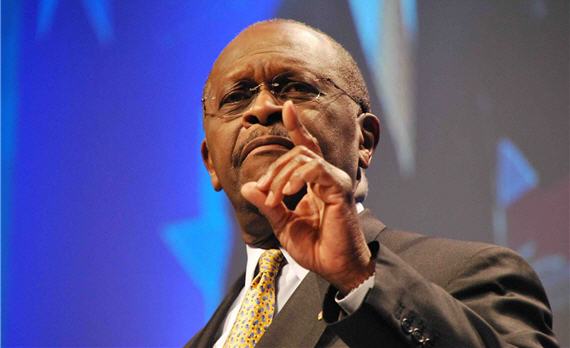

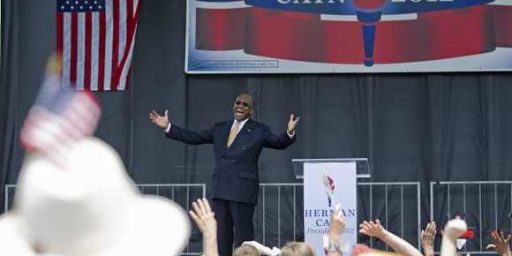

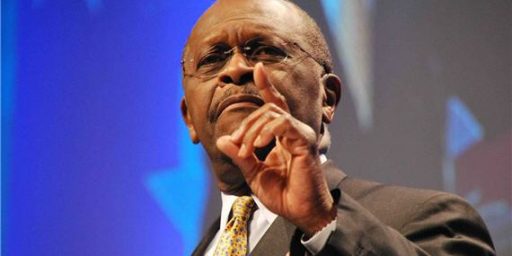
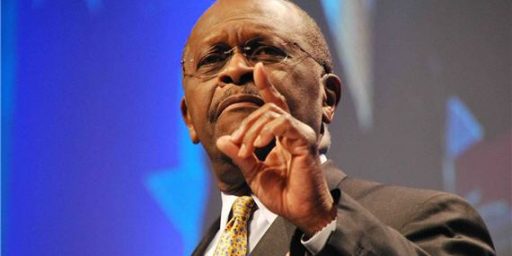
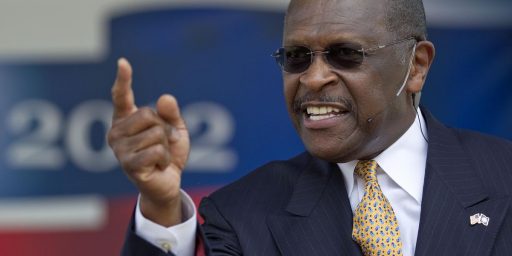
Very good, Mr. Joyner. We are almost done with this intelligent, smart, creative, but not-fit-for-the-presidency gentleman. True that!
As someone pointed out in the comment thread of one of my posts about Cain’s reliance on experts, if JFK had listened to the majority of his advisers in October 1962, he very well might have launched an attack on Cuba that could have thrown the world into war. Knowing what questions to ask your experts, and when to overrule them, may be among the more important qualities a President needs to posses, especially when it comes to foreign policy.
And on top of all that…which I agree with for the most part….the pizza sucks.
James this ought to be front page. It’s a good piece.
@michael reynolds: Thanks. Bumped it up, as I meant to. I checked the Quick Picks box when first drafting because I was just going to highlight Noonan’s piece but then expanded on it.
Seriously? A “unhelpful” because I think Godfathers pizza sucks?
C’mon…it’s like catsup on crackers.
Herm’s business plan is unfolding as intended.
James,
Too bad you didn’t apply the same scrutiny and logic to Bush the younger. Your critique of Cain would have worked quite well for Bush with the exception that Bush had no success in school, the military or business.
Three of your criticisms that seems to have been written with Bush in mind:
@Loviatar: Bush’s problems in office, and to a lesser extent the Sarah Palin saga, helped inform this, yes. I don’t think it had ever been an issue previously.
Now, I happen to think Bush was more policy oriented even early in the 2000 cycle than Cain is. He was at least very interested in politics and had, after all, been governor of a state for several years. But his lack of grounding in foreign policy was key to his coming under the sway of the Cheney-Wolfowitz-Feith crowd rather than the Rice-Gates-Powell circle that informed the campaign.
There is no question that Bush’s biggest problem is that he couldn’t say no to Dick.
This seems rather soundbitey.
I’m still finding insights in writers like Herodotus and Tacitus.
Ponce shoots…he scores!!!
@ponce: Sure. But I’m talking “news of the day” commentary, which is what Noonan is doing here. But the time she gets a chance to be heard on the subject, dozens of thoughtful pieces have already been written.
The alternative is to use it as a jumping off point to make a broader, lasting point–as I’ve tried to do in this post. But that’s sometimes hard to do within the confines of 700-800 words.
James: “But, rather clearly, he has managed to live 65 years without displaying any real interest in public policy–so much so that he’s not even paying attention to the most pressing issues unfolding while he’s running for president of the United States.”
This makes much more sense if you assume that he’s in the same business as Newt (and Palin) – drumming up money and publicity.
Doug Mataconis says:
“As someone pointed out in the comment thread of one of my posts about Cain’s reliance on experts, if JFK had listened to the majority of his advisers in October 1962, he very well might have launched an attack on Cuba that could have thrown the world into war. Knowing what questions to ask your experts, and when to overrule them, may be among the more important qualities a President needs to posses, especially when it comes to foreign policy. ”
Yes, and even in more normal circumstances, the President’s advisor will frequently disagree, and the President will have to decide. In the case of Obama, I feel that many of his problems come from listening to f*cking Harvard/Chicago economists at a time when they are wrong, and not emotionally realizing that they are wrong.
And, of course, in the case of Dubya, we were told back in 2000 that he would be surrounded by ‘wise men’. Look where that got us.
@James Joyner:
I’m assuming you’re saying its never been and issue prior to Bush.
—–
Why would you say this, can you point to anything in his pre- Presidency life that show this is true (I’ll get to his governorship in a moment).
—–
For someone with a Doctorate in Political Science you seem to have a streak of selective naivety when it comes to certain, lets say political parties, politicians and ideologies. Bush was governor of a state that is constitutionally structured to have a weak executive. Bush was interested in doing something with his life, he failed in the military, he failed in business, politics was his next go at it, where does that indicate that he had an interest in Politics.
—–
True, but of the criticisms listed I think Bush greatest failing was his lack of curiosity and the inability to make smart choices when presented with conflicting advice. Key personality traits for any executive.
@Hey Norm:
As I recall, he did manage to do that more than once in his 2nd term. (and at the moment, can not pick out a specific instance, so maybe I am wrong)
Best analysis of Cain the Canidate yet. Thanks.
@OzarkHillbilly:
whooosh
@Loviatar: Bush hardly “failed” in the military. He successfully completed pilot training and then got by with the minimum in the Air National Guard, which he joined solely to avoid service in Vietnam. He failed in the oil business–hardly unusual in a boom or bust industry–but was pretty successful with the Rangers.
And he got elected twice and was widely regarded as a really good conciliator as governor. That Texas has a “weak” executive really doesn’t have much to do with whether its occupants are interested in politics.
I don’t think Iraq was a failure of intellectual understanding, given how many experts were wrong on the war. I think that, post-9/11, he got caught under the spell of True Believers who convinced him that the right thing to do was to drain the swamp and permanently change the culture of the Middle East.
While I was ultimately persuaded that regime change was the right call, I was never a believer in the notion of nation building. But it’s understandable why he went down that road. Guys like Tony Blair, who are much smarter and policy oriented, did, too. Not to mention Hillary Clinton, John Kerry, and much of the Democratic foreign policy establishment.
James,
Please link to a single “thoughtful piece” that arrived before Noonan’s post.
One longer than 140 characters, please.
@ponce:
Marvel at How Little Herman Cain Has Learned About Libya in 6 Months — Conor Friedersdorf, Nov 14
Herman Cain Libya blunder casts doubt on fitness to be president — Ewan MacAskill, Nov 15
Herman Cain’s Known Unknowns — Paul Waldman, Nov 15
Why Herman Cain’s Libya moment matters — Ana Marie Cox, Nov 16
The Herman Cain Meltdown — Molly Ball, Nov 17
James,
What part of, say, Conor Friedersdorf’s piece do you consider “thoughtful?”
It’s only two paragraphs long excluding the quote.
Is the thoughtful in this paragraph:
In the video above, Herman Cain fields a question from the Milwaukee Journal Sentinel editorial board and appears to have no clue why they might be asking about Libya, or what President Obama’s policy was there. Eventually he says that he would’ve gotten more information than Obama did about the rebels, but he can’t say how it would have affected his actual decision making.
Or this one?
Like Rick Perry’s inability to remember one of the three federal agencies he would eliminate, the moment must be seen to be believed — do watch above, no description is adequate — and is damaging not because presidential candidates must know small details like the leader of Uzbekistan, but because Cain clearly hasn’t thought at all about a war his country was fighting while he ran for president. Presumably he was briefed on it prior to Saturday’s foreign policy debate. I asked him about Libya in our interview on May 25, 2011! Here’s the answer he gave back then:
@James Joyner:
I see you have selective memory along the lines of your selective naivety.
I know the right has made a cottage industry of burnishing Bush’s military service, but lets look at a couple of episodes
– Credible evidence that Bush was Absent Without Leave (AWOL) in 1972 and 1973 (usually leads to UCMJ action)
– Bush missed his flight physicals in 1972 and 1973 (as a former Army pilot, this is not done, the result is usually removal from flight status and UCMJ action)
– Bush missed multiple National Guard drills in 1972 and 1973 (usually leads to UCMJ action)
– Bush’s annual performance review for the period from May 1, 1972 to April 30, 1973 stated that “Lt. Bush has not been observed at this unit during the period of the report. (usually leads to a bad performance review and developmental counseling with the possibly of separation)
When I served this not considered a successful time in service.
—–
As part of a syndicate, Bush purchased the Rangers using a borrowed $500,000 for his share, he then sold it 10 years later reaping almost $15 million. Bush’s contribution to the deal other than his borrowed money was his “tenacity, contacts and persuasive personality”. Sounds like he was pretty successful at crony capitalism.
—–
Again for a person with a Doctorate in Political Science the sheer selective naivety of this statement, should cause you to blush in shame.
—–
Please show where prior to running for the governorship Bush had any interest in politics. As I said in my comment he was interested in doing something with his life, after failing in the military and in business, politics was next.
—–
This is Bush’s most profound failure from his time in office, it cost over 4000 Americans their lives, it cost 100,000s of Iraqis their lives and your statement on it is Ah, shit happens and oh by the way a lot other people got it wrong also. Whatever happened to the party of personal responsibility. You are a true modern day Republican.
I’m done with this thread, you
Perhaps this subject makes people uncomfortable, but I almost never see anyone talking about it.
I think that a very important part of the decision to invade Iraq was: it would be very good politics for Bush and for Republicans.
They’ve always felt they had a distinct advantage on the politics of defense. And after 9/11, and Afghanistan, it must have been very tempting, politically, to stay on offense.
I think they believed Iraq would be relatively easy, quick, and relatively cheap. And they would reap huge political capital. There’s no better example than Bush’s outrageous “Mission Accomplished” fly-boy stunt. Make the Republican President into a swaggering hero, and solidify their image as the national defense party.
No, I do not think this was the sole, or even the most important reason for their decision. (I am not sure exactly where it might have fit into the decision process.) And perhaps they didn’t ever discuss this out loud. But I feel quite certain that many in the administration were thinking about it.
Perhaps you find this too cynical, but I find it pretty hard to believe that this did not play at least some role in the decision to invade Iraq.
It could have even been the tipping point, since there wasn’t any actual urgency or emergency to invade. And why do it when they did, when we were already fighting a war in Afghanistan? Why over-extend like that, when there’s no imminent threat?
Strike when the iron is hot.
I remember my great dismay in 1994 when I learned, as I was writing an opinion piece for the occasion, that President Clinton had to be extensively briefed on D-Day before attending the 50th anniversary remembrances in Normandy. I thought “My God, no Republican President would need to do that. Who doesn’t know the history of D-Day?”.
I was pretty wrong about that. I couldn’t conceive at the time that the Republican Party, for all of its faults, would move to abandon its reliance on history, its classical liberalism and realpolitik (in the German sense) for this anti-intellectual, statist-dominionist travesty we have now.
I believe the one success of Bush’s business career, the Rangers new ballpark, was funded in large part by a tax increse. It significantly increased the value of the franchise, and of course a lot of that money ended up in Bush’s pocket.
“I remember my great dismay in 1994 when I learned, as I was writing an opinion piece for the occasion, that President Clinton had to be extensively briefed on D-Day before attending the 50th anniversary remembrances in Normandy.”
This is pretty hard to swallow. Can you back this up with some evidence? Especially the word “had”. I can understand pretty much anyone wanting to bone up, but you’re trying to make it sound like Mr. Clinton didn’t know much of anything about it. Pretty hard for me to believe.
Evidence?
The way things are going I won`t say he can not win the nomination. They keep coming back like a punching clown Weebles wobble but they don`t fall down
Sorry, Socrates, I don’t have the source; it was over seventeen years ago, after all. My best guess is that it was an AP article about the upcoming celebration that was in my local paper. But my distinct recollection was that he didn’t know very much of anything about D-Day. It was pretty hard for me to believe at the time.
A quick google search didn’t reveal the piece I remember, but it did remind me how weak and indecisive Clinton had been in his foreign policy at the time. I consider him to have been a pretty decent domestic policy president, but the first few years of his Presidency presented difficult foreign policy issues that he was just not equipped to address.